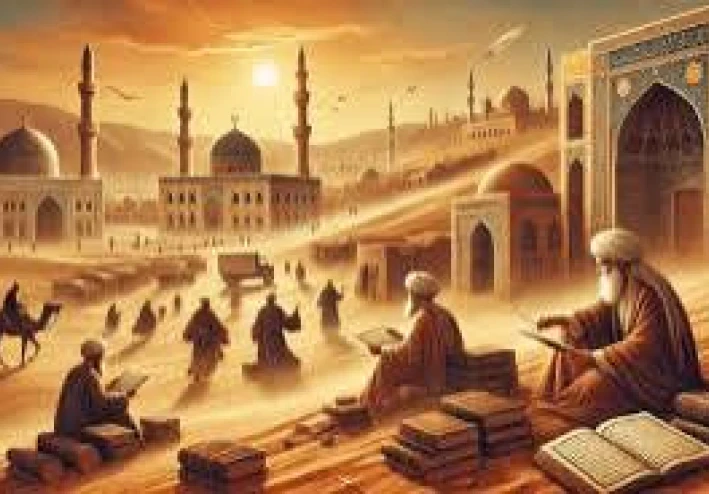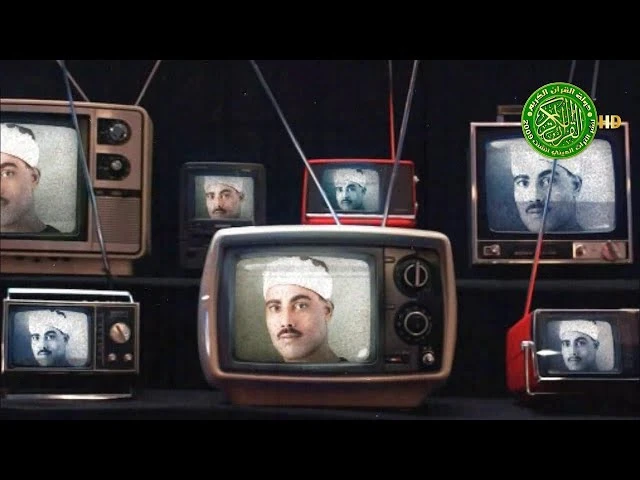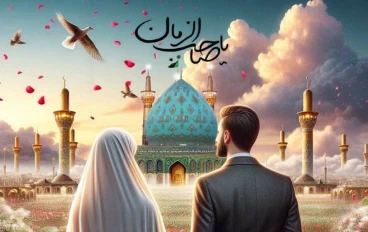
The Voice of Heaven: Sheikh Mahmoud Khalil Al-Hussary, Master of Quran Reciters
The Voice of Heaven: Sheikh Mahmoud Khalil Al-Hussary, Master of Quran Reciters

It was decreed for humanity that the Prophet of the End of Times would be an Arab prophet, who speaks the truth with honesty, and whose message is the clear Book, recited in an eloquent Arabic tongue that captivates ears and humbles hearts. Through melodious and soulful voices, the message of Islam spread—voices tender in tone, humble in spirit, and profound in meaning. These voices penetrated the very core of minds and hearts, inspiring countless souls to embrace Islam, moved by the beauty of its recitations and the depth of its meanings.
As a result, more than one billion and seven hundred million people around the world became Muslims—over one billion of whom are non-Arabs who were guided and inspired by the Quran’s melodies and its divine message.
The appreciation of beautiful recitation was not an innovation, but rather a continuation of the Prophet’s own tradition. The Prophet ﷺ himself chose among his Companions those with the most melodious voices to recite the Quran and perform the rites of worship.
Among them was Bilal, the devoted muezzin whose call to prayer moved hearts to tears, as well as Abdullah ibn Mas‘ud and Ubayy ibn Ka‘b (may Allah be pleased with them both), whose recitations were listened to by angels and awaited by the inhabitants of heaven.
Through these powerful and heartfelt voices, Muslims continued to raise the Quran’s sound across the earth, day and night. And when Egypt joined the fold of Islam, it honored the Quran through memorization, recitation, and teaching—becoming a cradle of the greatest reciters in the world. Egypt produced the finest voices, the most skillful memorizers, and the most devoted reciters. Among the most prominent of them was Sheikh Mahmoud Khalil Al-Hussary, the man behind the first recorded Quranic recitation (murtal) ever broadcast worldwide through the Egyptian Radio of the Holy Quran.-
Sheikh Mahmoud Khalil Al-Hussary
Sheikh Mahmoud Khalil Al-Hussary was born into a middle-class Egyptian family, like many among the Egyptian people. He studied at Al-Azhar Al-Sharif and the Ahmadi Mosque in Tanta.
His family name “Al-Hussary” came from his father, who loved mosques and used to weave prayer mats (ḥuṣur) for them. Sheikh Al-Hussary was his parents’ only child. His daughter, Yasmin Al-Khayyam (Ifrāj Al-Hussary), mentioned that her father—may Allah have mercy on him—was the devoted helper of both his parents, in addition to being a hafiz (memorizer) of the entire Quran.
He was known as the Sheikh of the Reciters, the first to initiate the movement to spread Quran memorization and recitation, and the founder of Quranic schools (kuttabs) across Egypt, the Arab world, and Africa.
Allah honored him in this world by immortalizing his name in Midan Al-Hussary (Al-Hussary Square)—one of Egypt’s most famous landmarks, named after his mosque in the city of 6th of October.
Birth and Early Life
Sheikh Mahmoud Khalil Al-Hussary was born in Shubra Al-Namla village, near Tanta, on the 1st of Dhul-Hijjah 1335 AH (corresponding to September 17, 1917).
Before his birth, his father moved from Fayoum to this village. He once saw a dream that later came true: he saw his spine forming and hanging with clusters of grapes, and people were eating from these clusters without them diminishing. A local sheikh interpreted this dream to mean that his son Mahmoud would be attached to Al-Azhar and destined for greatness.
True to the dream, Al-Hussary’s father enrolled him in a Quranic kuttab at the age of four. By eight, he had memorized the entire Quran. He used to travel daily from his village to the Ahmadi Mosque in Tanta to review and study. By twelve, he joined the Religious Institute of Tanta, and later pursued the Ten Quranic Readings (Al-Qira’at Al-‘Ashr) at Al-Azhar.
His Teachers
Sheikh Al-Hussary learned from renowned masters of Quranic recitation, whose scholarly chains of transmission traced directly back to the Prophet ﷺ. Among his teachers were:
Sheikh Ibrahim ibn Ahmad Salam Al-Maliki, from whom he learned the minor readings (Al-Qira’at Al-Sughra) and received ijazah with a continuous chain.
- Sheikh Ahmad Mustafa Murad Al-Marhoumi
- Sheikh Ali Hasan Abu Shabana
- Sheikh Muhammad Al-‘Uqla, Sheikh Muhammad Yusuf, and Sheikh Abu Al-‘Azm Mustafa
- Sheikh Muhammad Ali Al-Dabba‘, the then Sheikh of Egyptian Reciters.
Academic Journey and Career
After mastering Quran memorization by age eight, Al-Hussary dedicated his life to Quranic sciences, excelling in the Ten Readings. He became the first to recite them on Egyptian Radio, and later recorded the Quran in multiple canonical versions (riwayat).
- Key milestones in his career include:
- 1944 – Passed the Egyptian Radio audition, ranking first among all applicants, and became a regular reciter.
- 1950 – Appointed as reciter at Al-Ahmadi Mosque in Tanta.
- 1955 – Became the official reciter of Al-Hussein Mosque in Cairo.
- 1957 – Appointed Inspector of Quranic Schools (Maqari’) in Egypt.
- 1959 – Became a reviewer and proofreader of Quranic manuscripts at Al-Azhar.
- 1961 – Appointed Head of Egyptian Quranic Reciters (Sheikh Al-Maqari’).
- The same year, he recorded the first audio Quran (murattal) in the world, in the riwayah of Hafs ‘an ‘Asim.
For nearly a decade, his voice alone was the one broadcast by Egypt’s Quran Radio.
Notable Moments in His Life
Sheikh Al-Hussary was more than a reciter—he was a scholar, teacher, and reformer in the field of Quranic studies. His dedication had a profound impact on reciters across the Muslim world. Among his major achievements:
1963: While visiting Kuwait, he discovered corrupted printed copies of the Quran published by a Zionist press, where the word “غير” (“other than”) was removed from the verse “And whoever seeks a religion other than Islam—it will never be accepted of him”. The error changed the verse’s meaning completely.
In response, Al-Azhar commissioned the complete recording of the Quran by Al-Hussary’s voice, to preserve its correct form—making it the first complete recorded Quran in history.
He was the first to grant ijazah (authorization) in the recitation of Hafs ‘an ‘Asim to an Imam of the Prophet’s Mosque in Madinah, Sheikh Abdul Aziz bin Saleh.
He was the first to recite the Quran at the United Nations, the Royal Palace in London, and the U.S. Congress.
In 1960, he accompanied President Gamal Abdel Nasser on a state visit to India and Pakistan, reciting the Quran before Nehru and other world leaders.
He produced the first “Teaching Quran” (Mushaf Al-Mu‘allim), later translated for non-Arabic speakers, still broadcast today.
1973: During his visit to the United States, he recited before the UN General Assembly, and several Americans embraced Islam after hearing his recitation.
1967: Appointed as Quranic Expert at Al-Azhar’s Islamic Research Academy.
1968: Received the Order of Science and Arts, First Class, and was elected President of the International Union of Quran Reciters.
Recorded the Quran in Riwayah of Qalun and Al-Duri, making him the first reciter to complete such diverse recordings.-
His Death
In his later years, Sheikh Al-Hussary suffered from heart disease and was treated at the Egyptian Heart Institute.
After more than fifty years in service to the Quran, he passed away peacefully on Monday, November 24, 1980, after the Isha prayer.
His final will was to donate one-third of his wealth to support Quranic education and memorization, and to build a mosque and a religious institute in his hometown, Shubra Al-Naml--
Legacy
According to a study by Dr. Muhammad Noor Abdul Noor, Professor of Islamic Archaeology at Sohag University,
> “The Quran was revealed in Makkah, written in Iraq, and preserved in Egypt.”
Egypt’s long-standing tradition of kuttabs (Quranic schools) and religious institutes played a key role in keeping Quranic memorization alive. Egyptian reciters, generation after generation, carried authentic chains of transmission reaching back to the Prophet ﷺ.
Thus, Allah destined that His Book be preserved not only in written form, but also in the hearts of Egypt’s reciters and the voices broadcast across the globe through the Egyptian Radio of the Holy Quran—a true fortress guarding the eternal words of Allah.
Sources
The Quran in the Voice of Egypt – by Abu Talib Mahmoud
Ambassadors of the Quran – by Mohammad Abdul Aziz
Additional verified sources






































